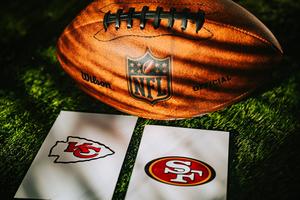Super Bowl Sunday: Why We Love to Watch Team Sports
COMMENTARY: As former Supreme Court Justice Earl Warren once remarked, “I always turn to the sports pages first, which records people’s accomplishments. The front page has nothing but man’s failures.”

There are four basic ingredients to team sports that mirror the very same ingredients that are required for a good life. These basic ingredients are goal, order, skill, and cooperation.
Every sport needs a goal: The football player desires the end zone, the hockey player seeks the net, the basketball player aims for the hoop, while the baseball player hopes to cross home plate. Collectively, each team wants to win.
Secondly, order is clearly apparent on the gridiron, the red and blue lines on the surface of the hockey rink, the painted lines on the court, and the circuit that runs from first base to home. No athlete can long endure in his sport if he lacks the requisite skills.
Finally, cooperation is essential, whether it be the assists in hockey, basketball and baseball or the sacrifices that the batter makes to advance a runner.
The fact that life is difficult whereas watching sports on TV is easy, gives spectating a huge advantage over participating. A glimpse of some of the astronomical salaries paid to professional athletes indicates the immense popularity and success of team sports.
Mookie Betts of the Los Angeles Dodgers, has a contract guaranteeing him $365 million over 10 years. Giannis Antetokounpo has signed with the Milwaukee Bucks for $218.200 million for five years. Tampa Bay Buccaneers’quarterback Tom Brady recently purchased a $2 million yacht, which is a mere 1% of his estimated worth of $200 million. A Mickey Mantle rookie card has sold for $5.2 million, while a Wayne Gretzky rookie card netted $1.29 million. The COVID-depressed economy does not seem to have affected the stratospheric salaries of star players or lessened the enthusiasm of its fans.
The TV watcher allows no excuses for mishaps. He may fly into a rage over a fumble, penalty, foul or error. Fred Snodgrass, Bill Buckner, “Wrong Way” Jim Marshall, Leon Lett and Mickey Owen, to name just a few, have been immortalized in a Hall of Shame for making public miscues, often at critical times.
The viewer, however, may be a clever practitioner of excuses for his own failures. What is the goal of life? Do I invent my own goals? Does God exist? If I submit to order, do I thereby lose my freedom?
Virtue is a nice ideal, but the path of least resistance is irresistible. And as for cooperation, why should I sacrifice opportunities for myself in the interest of others who have little or no regard for me?
As former Supreme Court Justice Earl Warren once remarked, “I always turn to the sports pages first, which records people’s accomplishments. The front page has nothing but man’s failures.” The successes in the world of sports can easily outshine the dismal record of daily life.
We can easily excuse our own moral failures, though we demand perfection from our sports heroes. This anomaly may be explained, at least in part, by the fact that we love to observe what may be too difficult for us to achieve.
In other words, we love to witness something for which we are capable, but lack the motivation to accomplish. We project our better selves onto the TV screen and applaud what we could be. We identify more with our sports heroes than we do with ourselves. Hence the lucrative sales of sports shirts with the names of our heroes emblazoned on them. In our own personal lives, we tend to be sluggish. “Most people,” according to William James, “never run far enough on their first wind to find out they’ve got a second.”
St. Paul urges us to transfer the virtues of sport to the energies of life. In 1 Corinthians, 9:24-27 he makes the following statement:
“Do you not know that in a race all the runners run, but only one gets the prize? Run in such a way as to get the prize. Everyone who competes in the games goes into strict training. They do it to get a crown that will not last, but we do it to get a crown that will last forever. Therefore I do not run like someone running aimlessly; I do not fight like a boxer beating the air. No, I strike a blow to my body and make it my slave so that after I have preached to others, I myself will not be disqualified for the prize.”
Hall of Fame football coach Vince Lombardi was fond of citing St. Paul to motivate his players. Lombardi, a daily communicant throughout his life (as was his father) and a Fourth Degree Knight of Columbus, understood that life is more important than the game. Vatican II echoed this notion of striving in stating that “All the faithful of Christ are invited to strive for the holiness and perfection of their own proper state. Indeed they have an obligation to strive.”
Lombardi modified the reference to perfection when he famously remarked that “Perfection is not attainable. But if we chase perfection, we can catch excellence.” He had a talent for aphorisms. “Winners never quit,” he said, “and quitters never win.” “The only place success comes before work is in the dictionary.” Lombardi led his Green Bay Packers to three straight NFL championships and, in 1966 and 1967, the first two Super Bowl victories.
We love to watch team sports because we find therein an image of our better selves. The Catholic Church, however, enjoins us to be our better selves.
Sports may provide an inspiration for us to be that better self. In that case, it realizes a more important victory than whatever trophies and pennants it can win.
- Keywords:
- super bowl
- team sports
- watching super bowl

















